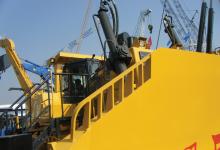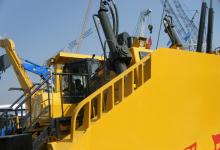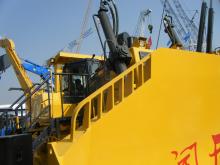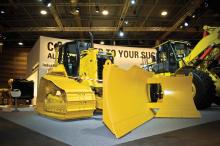Chinese firms are looking to develop overseas sales but are using very different strategies – Mike Woof reports.
Aggressive expansion plans will see Chinese manufacturers boosting overseas sales in coming years. These companies are developing bigger sales profiles around the world, particularly in emergent markets such as Africa, the Middle East and Latin America. It is worth noting too that Chinese products continue to gain in terms of quality and performance. For LiuGong, Sany, Shantui, XCMG and Zoomlion
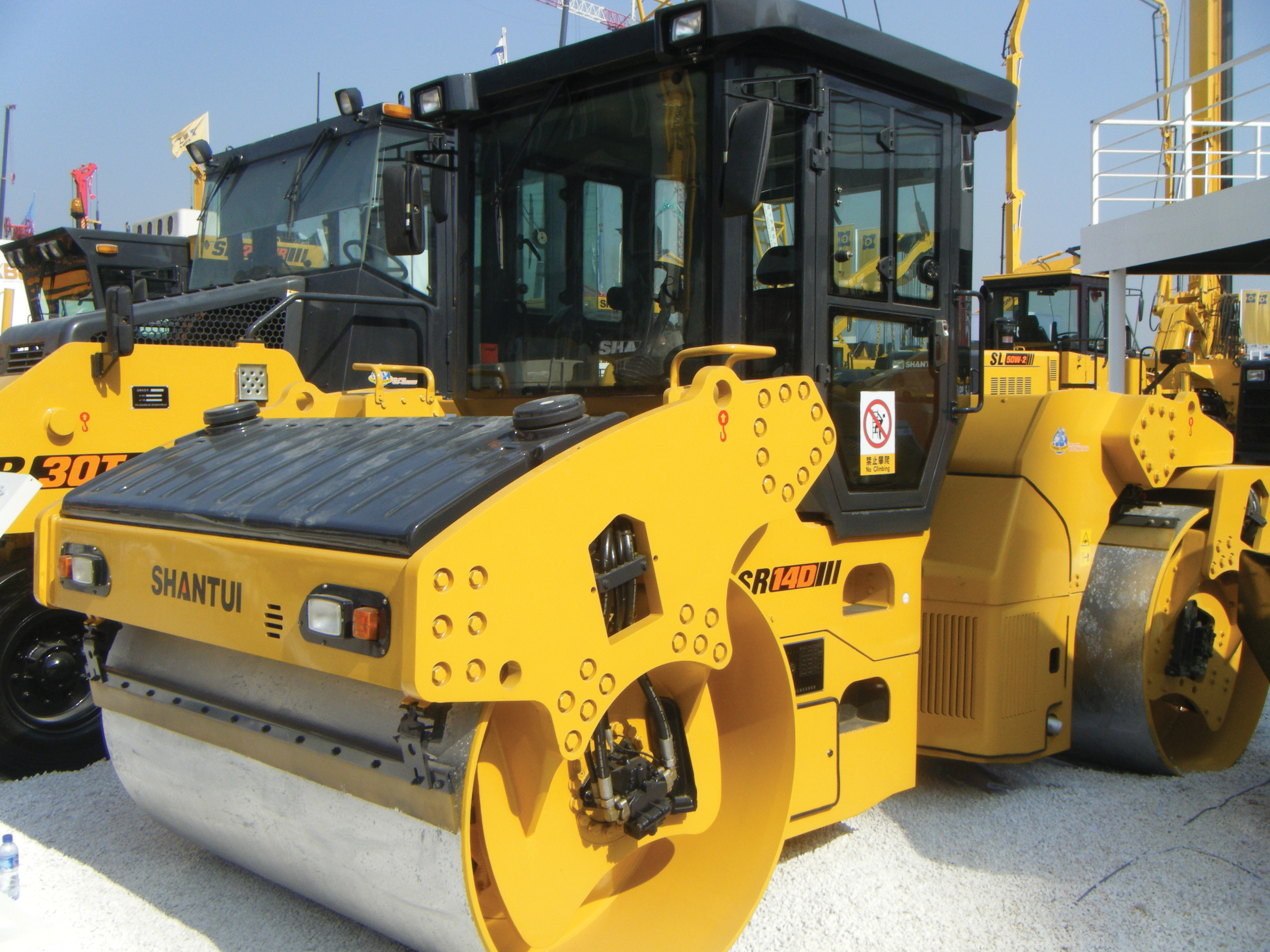
Shantui is boosting its range by offering road machines
Chinese firms are looking to develop overseas sales but are using very different strategies – Mike Woof reports
Aggressive expansion plans will see Chinese manufacturers boosting overseas sales in coming years. These companies are developing bigger sales profiles around the world, particularly in emergent markets such as Africa, the Middle East and Latin America. It is worth noting too that Chinese products continue to gain in terms of quality and performance. ForLiuGong is a major exporter of machines and sells large numbers of its units to Chinese contractors working in other countries. The company has also established an extensive dealer network and hired highly experienced senior executives from other firms to boost its overseas sales. Unlike other firms that have hired in engineers to design new models though, at LiuGong the emphasis is on developing skills amongst Chinese engineers.
Earlier this year LiuGong also announced its intention to buy the construction machinery segment of state-owned Polish manufacturer HSW, which sells bulldozers under the
The move broadens LiuGong’s product range as well as giving it a manufacturing capability in central Europe that is well positioned to supply demand in the EC nations as well as Russia. Beatenbough explained that the transport costs involved in building excavators in China for sale in Europe do not make this a long term economic proposition and he said, “If we’re going to be global we have to manufacture worldwide.”
Although Poland is a low cost production country within Europe, it is more expensive to build machines there than in China. But operating on an international scale is allowing LiuGong to benefit from local price differences too. Interestingly, Beatenbough commented that local prices on steel vary considerably across the world and he said that at present such materials can be bought at considerably lower prices in the UK than in China for example.
The Dressta product range is well regarded for its quality and developed from the Dresser units, themselves descended from the International Harvester line-up. The deal provides a skilled workforce too although HSW’s manufacturing facilities will need extensive investment. The move provides a key boost for LiuGong and Beatenbough explained, “We’re buying a complete dozer range. The dozer line-up we have at present is incomplete and is just for China.”
LiuGong will have to develop a new distribution network though as the Dressta machines have been sold through
In comparison, Sany is in the process of setting up manufacturing operations in other countries to broaden its international profile. New factories are under construction in Brazil, Germany, India and the USA and these are scheduled to commence the first production during 2012. John Ngai is deputy general manager for Sany Overseas and he explained, “It’s important that Sany engages into the market. Other companies may engage by acquisition but Sany has taken the direct route by setting up factories and creating jobs.”
In the US the firm will initially focus on its cranes but also plans to start building sales of its concrete pumps. The firm has an international sales strategy and Ngai said, “When we selected the dealers locally, the decision was made depending on what machines we want to launch in that country.”
The company may further develop its dealer network in some countries and might even buy some firms, adding expertise so that in can market a broader range of machines according to Ngai. Sany’s approach is driven very much by its owner according to Ngai. “His vision is to bring Chinese products to a world market.”
Around 10-20% of the firm’s business is from export at present but Sany’s international presence is set to grow once its new factories in Brazil, Germany, India and the US come fully on-stream. Ngai said that the company is changing and commented, “Initially it was very much a Chinese company but as we started to build the business we started to hire locally. We have to listen to local people to know those countries.”
While the firm wants to continue to develop its product line, some sectors are seen as either too specialised or non-core and Ngai said, “We don’t plan to enter the engine business.”
Meanwhile Shantui is using yet another strategy. The firm has been heavily reliant on its bulldozer line in the past and these products still form the core of its business. However the company has taken steps to address its reliance on a single product line. Several years ago it established a partnership with a European firm to build road machinery under licence for China and has also bought up a number of other smaller manufacturers to further broaden the range. This acquisition strategy has seen the firm’s sales double in the 2009-2010 period, with the prospect of further growth to come. Concrete pump and batching plants were added with one of the purchases, while an array of tower cranes, truck cranes, rough terrain cranes and all terrain cranes came with another. The new E254 concrete pump is the largest in the range and its launch shows how the firm wants to further expand its product offering.
Components sales also make up an important part of Shantui’s business. Bulldozers by their nature are hard on undercarriages and require regular replacement of parts, which Shantui is geared up to supply. The firm also makes castings, undercarriage components, drives and pumps for use on machines such as excavators, drills and pavers from other manufacturers with this forming a key part of its operations and its future growth. Supplying price-competitive, quality parts for construction equipment, including components for leading international brands, is seen as a major source of revenue in the long term and Shantui fully intends to develop sales both in China and for export. Emergent markets are the primary focus for exports with a factory planned in Brazil although Shantui does have some models that are emission compliant to meet European and North American requirements.
Despite the company’s growing product range and its components operation, the firm is also keen to continue development of its dozer business, having invested in a huge manufacturing facility for this range. In terms of dozers produced and sold, Shantui now claims to out-perform either
Different again is XCMG, which is one of China’s largest exporters of construction machines. The firm keeps a relatively low profile in comparison with some of its competitors and marketing director Tang De Xin said, “This year we will export around US$1.1 billion worth of machines.”
The company specialises in cranes and lifting, as well as compaction machines and wheeled loaders. It has also now returned to the crawler excavator market, having previously left this segment. The company had an agreement with Caterpillar many years ago to build excavators for the Chinese market but XCMG opted to let this drop as sales of crawler excavators were insufficient to make the deal worthwhile. The firm now offers a modern line-up of excavators and is achieving strong sales overseas. The company has been one of China’s biggest exporters of construction machinery, with certain markets being key to its sales. South America is a highly important market for the firm, as are Africa, the Middle East, Central Asia and South East Asia. Different sales profiles are seen in these territories though with the company selling its products to local contractors in South America, the Middle East and Central Asia for example. A major sales success for XCMG has been a deal to supply a huge equipment order to Venezuela. In Africa though Chinese contractors are highly active at present and these firms provide a ready sales potential for XCMG according to the firm. The Chinese contractors tend to hang on to these machine fleets, moving them from one project to another, rather than selling them off to local companies. Because of this, XCMG has somewhat greater international sales than its dealer profile in some territories might initially suggest.
For Zoomlion a key move was to develop an international profile through its acquisition of Italian concrete pump manufacturer
This deal gave Zoomlion direct access to advanced European technology, as well as a deeper understanding of the work involved in meeting CE requirements. The knowledge is being used within the firm to ensure that its other products can meet European and US requirements and will aid the company in growing its international profile. Zoomlion’s core product lines are its cranes and concrete machinery, although products such as the concrete batching plants are mainly for the Chinese market rather than export. But Zoomlion designs its machines to the needs of the local market, meeting the CE classification in Europe or the equivalent standards in Russia and the CIS states for example.
Meanwhile further international investment could continue to swell China’s manufacturing capacity. The Chinese city of Changsha is looking to attract international firms to set up manufacturing operations in its fast growing industrial zone so as to tackle China’s huge demand for equipment. Building machines close to where the demand is strongest helps reduce transport costs and the mayor of Changsha is keen to encourage overseas manufacturers to set up production facilities in the area. Home to a number of China’s larger manufacturers, the area has access to an extensive workforce already while sites are ready for green-field development and the local authorities are very open to foreign investment.



